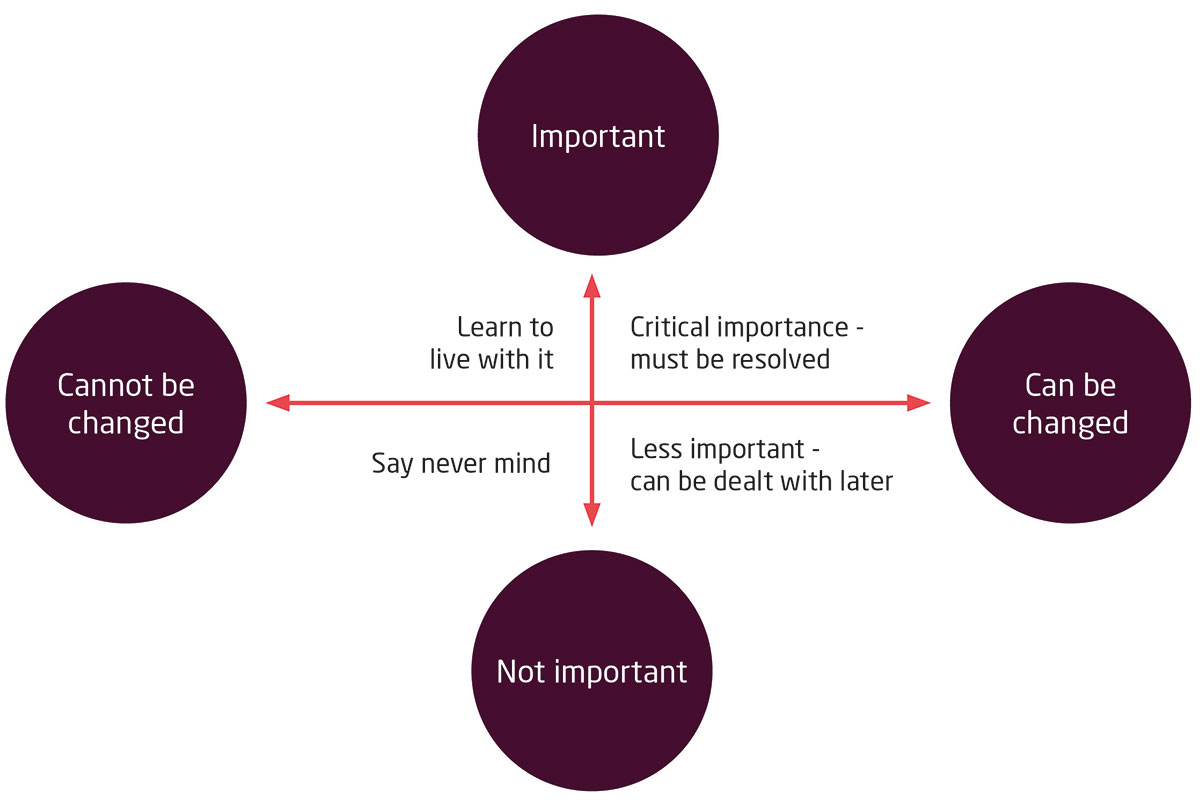Get to know your own signals
Get familiar with symptoms and warning signs – react if you feel them. Visit your own doctor or talk to someone you trust. Write down your symptoms.
If the stress develops, you must act. First symptoms vary from person to person: Do you have problems sleeping? Are you forgetting things? Are you short-tempered?
Learn to say no
Talk to your manager if you can’t manage more tasks and ask for help to prioritise tasks. It’s important speak up if you’re feeling overburdened, others might not see it. The dialogue between you and your manager about your tasks is important so that together you can adjust your workload. You can use the model below to set your priorities:

Plan and prioritise your time
Start your day by getting an overview of your tasks and prioritise them, one at a time. Be aware of time-consuming tasks and remember to take breaks. If your workload exceeds the time available, your manager can help you prioritise your tasks.
Also make sure that the distribution of roles is clear to avoid conflicts.
Never feel guilty. S say to yourself that you’re doing the best you can. It’s enough to write things down, prioritise tasks, and do one thing at a time. Learn to follow your gut feeling, and stand by your choices.
Make sure you have a network of colleagues, family and friends to help you in difficult situations and ask for support from your manager.
Strengthen your resilience
- Eat regular and healthy meals and snacks.
- Exercise regularly and get plenty of fresh air.
- Make sure to get enough sleep (at least 7 hours).
- Don’t work when you’re off.
- Do something that unwinds and relaxes you.
How to help a colleague suffering from stress
People suffering from stress are often unaware of their stress, and therefore they don’t think about getting help. Moreover, many people are embarrassed about not being able to cope with their jobs, or are worried about losing their job.
Act on your colleague's stress
Many people are afraid of interfering, but this is a misconception: doing nothing is the worst you can do.
To spot the first signs of stress, you must have a certain knowledge about stress symptoms and behaviour. For example, that a colleague forgets agreements, words and names, loses their thread, does not complete sentences and arguments, is absent-minded and seems more irritable, dispirited and detached than usual.
If a coallegue is showing signs of stress
- Be considerate and talk to your colleague at an appropriate time and place.
- Tell your colleague what you are concerned about.
- Listen attentively without judging, so that your colleague feels heard and understood.
- Agree how to follow up on the conversation.
- If you can’t provide the necessary help yourself, help your colleague with the next step.
- If you can’t talk about it yourself, find someone who can.
- If your colleague denies being stressed, let it go for the moment. Bring it up again if the problem doesn’t seem to change.
Prevent stress in your team
- Take breaks and talk to each other. Breaks are an effective tool against stress. Five minutes now and then is enough to calm down. During breaks, you can talk to each other about problems, challenges and the things that stress you.
- Keep an eye on each other. Keep an eye on your colleagues and act if a colleague is showing signs of stress.
- Support each other. Social support in stressful situations can minimise stress reactions. Support can come both from managers and colleagues, and it can be both psychological – “We’ll get through this together” – and practical in the form of help to carry out a task. Acknowledge good work. Praise each other and back up each other. Also remember to support each other with practical help.
- Plan work together. If you plan things together and brief each other, you’ll all know what’s going to happen and how work is progressing, and this also prevents stress. Have a clear division of labour. If you’re in doubt about roles and responsibilities, go to your immediate manager.
- Strenthen social networks. Good relationships with colleagues are especially important if you are to be able to talk about problems with stress and find solutions together.

